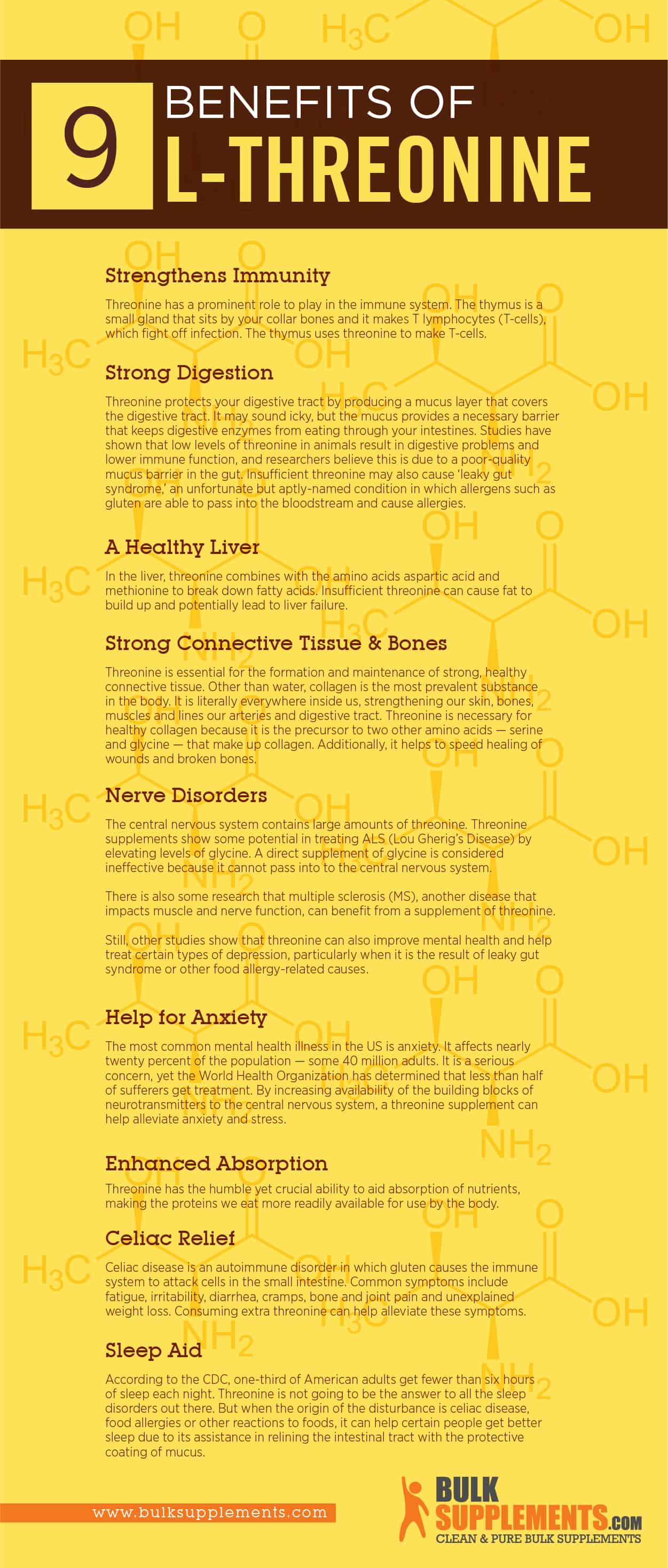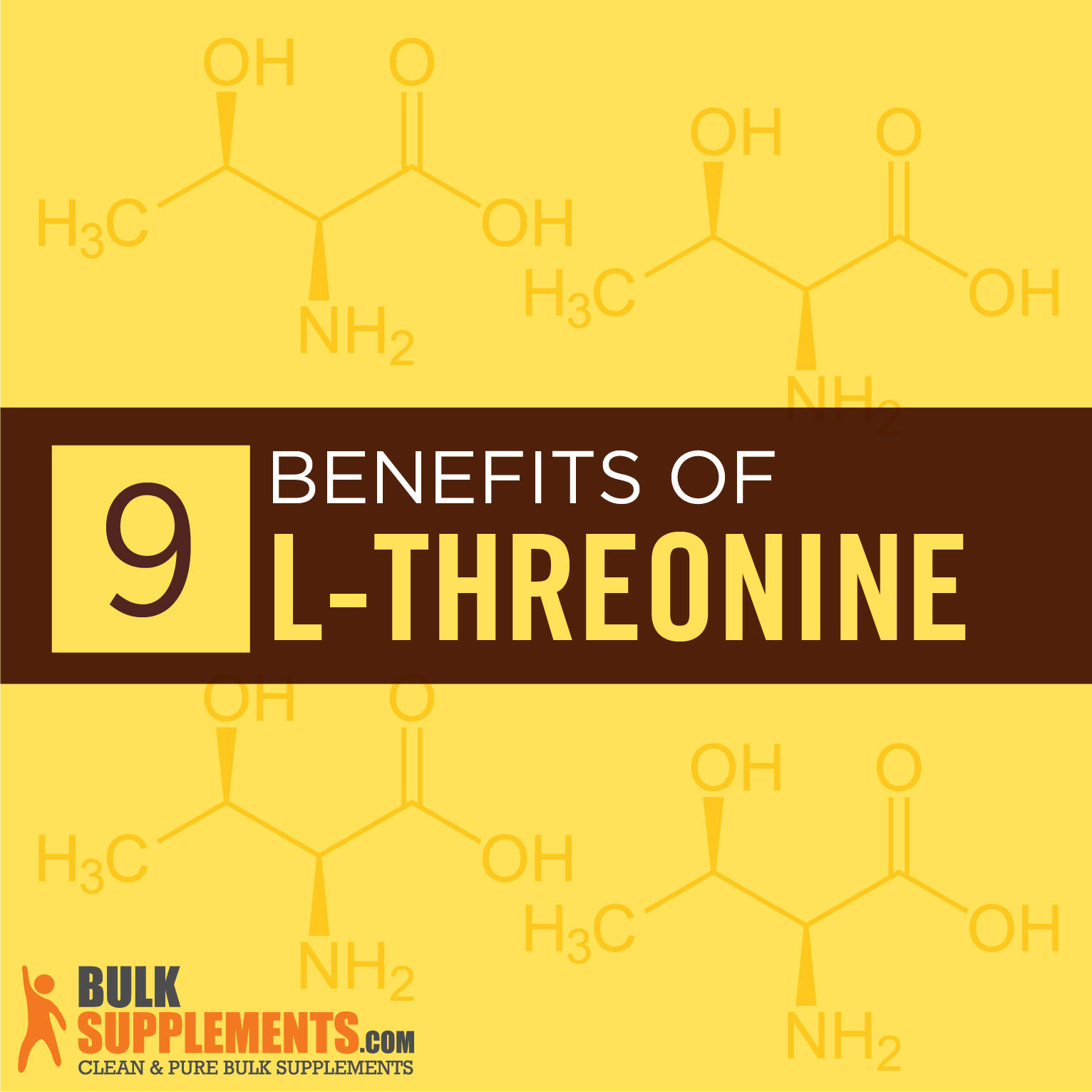Updated: 12/18/23
Have you ever felt like your workouts were lacking that extra boost of endurance or your brain was missing its usual sharpness? If so, you’re not alone. While the typical culprits like caffeine, carbohydrates and creatine certainly have their place, there may be another relatively under-the-radar nutrient that could help take your performance to the next level – both physically and mentally. L-threonine is an amino acid that most people don’t think twice about, but new research suggests it plays a key role in protein synthesis, immunity, digestive health and more.
In this article, we’ll dive into what L-threonine is, the potential benefits research has found so far and ways you may want to consider adding it to your supplement regimen if you’re looking to squeeze a little more out of your workouts and brainpower. Stick with me and by the end, you may have a newfound appreciation for this overlooked amino acid.
What is L-Threonine?
L-Threonine is a non-polar, aliphatic amino acid that contains an alcohol group. It is an essential amino acid that cannot be produced by the body and must be obtained through dietary sources. It is classified as a hydrophilic amino acid, which means that it attracts water molecules and can dissolve in aqueous solutions. L-Threonine is essential for maintaining skin and muscle health and is also important for helping to form collagen and elastin. It is commonly in use in the production of various skin care products, such as lotions and serums.
It is in bacteria, yeast, and plants, using a fermentation process. Bacteria and yeast produce L-Threonine using a specific type of fermentation that involves the use of glucose as a substrate. Plants produce L-Threonine using a similar pathway, but they use sunlight and carbon dioxide as their source of energy.
It is an essential nutrient that is involved in a vast array of biological processes. It plays a vital role in the biosynthesis of proteins, which are essential for muscle growth and repair. L-Threonine is also a precursor for the synthesis of glycine and serine, amino acids that are important for the health of the nervous system. It also plays a crucial role in the maintenance of the immune system and can help to improve wound healing and reduce inflammation.
L-Threonine Benefits
Promotes Healthy Immune Function
The immune system is a critical aspect of our overall well-being, and L-Threonine plays an essential role in promoting its healthy function. This amino acid helps to form antibodies and immune cells, which protect the body from infections, viruses, and other harmful pathogens.
Hair and Nail Growth
It is an essential amino acid for hair and nail growth, and it can help improve the health and appearance of your hair and nails. L-threonine is beneficial in collagen production, which is an essential component of healthy hair and nails. If you’re looking for a natural way to stay beautiful and youthful looking, make sure you include L-threonine-rich foods in your diet, such as lentils, almonds, sunflower seeds, and eggs.
Necessary for Vitamin B12 Absorption
It is a critical amino acid that is necessary for the absorption of vitamin B12. This essential vitamin is essential for the proper functioning of the brain and nervous system. L-threonine is essential for the formation and maintenance of the myelin sheath, allowing for faster nerve conduction. Make sure you have some L-threonine supplements to maintain adequate vitamin B12 absorption.
Helps to Reduce Anxiety
It is a precursor to glycine, an amino acid that has been shown to have a calming effect on the brain. Supplementing with L-Threonine can therefore help reduce anxiety, promote better sleep, and help to boost overall mood.
Supports Sleep
It contains an essential sleep-inducing chemical called glycine, which helps regulate the central nervous system by preventing muscle spasms. Glycine is a co-agonist to serotonin and norepinephrine that facilitates a sense of sleepiness. You can add more L-threonine to your diet by eating some nuts, seeds, tofu, lentils, and wheat germ, which provide rich sources of this magical amino acid.
May Prevent Fatty Liver
Fatty liver disease is a condition characterized by the accumulation of fat in the liver, which affects its function. The causes of fatty liver disease may vary, but it’s often associated with conditions like obesity, high blood sugar, and high blood pressure. The good news is that by including L-threonine in your diet, you could lower your risk of developing fatty liver disease. L-threonine helps to keep your liver healthy by promoting liver function and detoxification. How? By stimulating the production of bile, a substance that helps to digest fats in the liver, reducing the accumulation of fat and thereby mitigating the risk for chronic liver diseases.
Helps with Gluten Sensitivity
If you have celiac disease, gluten sensitivity, or any form of an allergy or intolerance to gluten, you should consider taking supplements. It is excellent for people looking to repair the gut lining. L-threonine aids the growth of beneficial intestinal flora, which in turn is essential in alleviating inflammation caused by the gut-sensitive issues.
May Improve Cognitive Function
It is also essential for cognitive function, as it is a precursor for neurotransmitters, such as serine and glycine. These neurotransmitters are essential for proper brain function, including memory, mood regulation, and attention. Research has shown that low levels of L-threonine can impair cognitive function, while supplementation can improve cognitive performance.
May Improve Muscle Growth and Recovery
It is an excellent source of amino acids that play a crucial role in muscle growth, repair, and recovery. It assists in the formation of collagen and elastin, which are essential for healthy skin, nails, hair, and joints. L-threonine also helps to promote the production of glycine and serine, which further supports muscle growth and recovery.
May Benefit Symptoms of ALS
ALS is a debilitating disease that affects the motor neurons in the brain and spinal cord, causing them to degenerate and weaken. Eventually, the muscles these neurons control atrophy, making it more difficult to move and ultimately resulting in paralysis. There is no known cure for ALS, but some studies suggest that L-threonine may help to manage its symptoms. L-threonine is known to promote the production of glutathione, an antioxidant that protects cells against oxidative stress, which is thought to contribute to the progression of ALS. Some researchers even argue that maintaining an adequate supply of glutathione through L-threonine can help to slow down the deterioration of motor neurons, which can improve symptoms like muscle spasticity and fatigue.
Supports Digestive Health
It is also beneficial for those with digestive issues, especially those with inflammatory bowel disease (IBD). It helps to repair the intestinal lining, reduces inflammation, and promotes the growth of beneficial bacteria in the gut, ensuring better overall digestive health.
Supports Healthy Cardiovascular Function
Cardiovascular health is of utmost importance when it comes to maintaining our overall health and well-being. L-Threonine can help to lower homocysteine levels in the blood, a non-protein amino acid that can cause blood clotting and cardiovascular health issues. Lowering homocysteine levels can help prevent the onset of heart disease, stroke and other cardiovascular issues.
May Improve Exercise Performance
It is essential for the production of glycogen, the primary source of energy during physical activity. By supplementing with L-Threonine, athletes and workout enthusiasts can experience increased endurance, improved energy levels, and a quicker post-workout recovery time.

L-Threonine Side Effects
Digestive Issues
One of the most common negative side effects of supplementation is digestive discomfort. Some people may experience bloating, gas, diarrhea, or constipation when taking this amino acid. This can be due to the fact that L-Threonine is involved in the production of digestive enzymes and can disrupt the delicate balance of gut bacteria. If you experience any digestive issues while taking L-Threonine, it’s best to reduce your dose or stop taking it altogether.
Allergic Reactions
Like any other supplement or food, it can trigger an allergic reaction in certain individuals. Symptoms of an allergic reaction can include hives, rash, itching, swelling of the tongue or throat, and difficulty breathing. If you experience any of these symptoms after taking L-Threonine, seek medical attention immediately.
Interactions with Other Medications
It can interact with certain medications, such as levodopa, which is used to treat Parkinson’s disease. Itcan decrease the absorption of levodopa, reducing its effectiveness. If you’re taking any medications, especially those related to brain health, consult with your healthcare provider before taking L-Threonine.
Can Increase Homocysteine Levels
Homocysteine is an amino acid linked to an increased risk of heart disease, stroke, and dementia. Some studies have shown that high doses of L-Threonine can increase homocysteine levels in the blood. The evidence is not conclusive. To be on the safe side, it’s best to avoid high doses of L-Threonine. Consult with your healthcare provider if you’re at risk of these conditions.
Can Interfere with Protein Metabolism
It involves in the production of other amino acids, such as glycine and serine. However, high doses of L-Threonine can interfere with the metabolism of other amino acids, leading to imbalances and deficiencies. This can have negative consequences on muscle growth, immune function, and overall health.
Dosage
The usual dose is between 100-500 mg per day. Up to three 500 mg capsules can be taken in one day if required. Magnesium, vitamin B6 and niacin are also needed along with the threonine in order to synthesize non-essential amino acids including serine and glycine.
Where to Buy L-Threonine
Looking for top-notch L-Threonine and pure dietary supplements? Look no further than BulkSupplements.com! With their industry-leading expertise, they not only develop their own products but also supply high-quality ingredients to other renowned brands in the food and supplement industry. Rest assured, all products at BulkSupplements.com are manufactured and rigorously tested following the highest manufacturing practices. Don’t miss out! Try L-Threonine as a dietary supplement and place your order today at BulkSupplements.com.
The Bottom Line
L-Threonine is an essential amino acid that boasts several health benefits. From boosting your immune system to repairing gut lining, supporting better sleep, improving hair and nail growth to vitamin B12 absorption, making L-threonine-rich foods a part of your diet is an excellent way to keep you healthy and maintain optimal wellbeing. So, if you’re looking for simple ways to improve your health, consider including L-threonine in your diet today.
It has several potential benefits when taken in moderation and as part of a balanced diet. However, like any other supplement, there are negative side effects with L-Threonine that shouldn’t be ignored. If you’re considering taking it for its benefits, consult with your healthcare provider, start with a low dose, and monitor your body’s response closely. By listening to your body and being cautious, you can reap the benefits of L-Threonine while avoiding its potential downsides.


